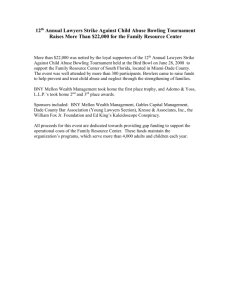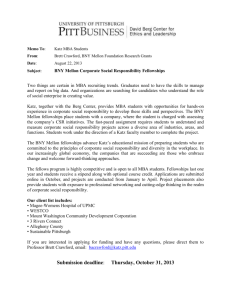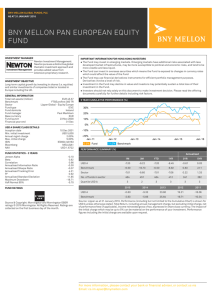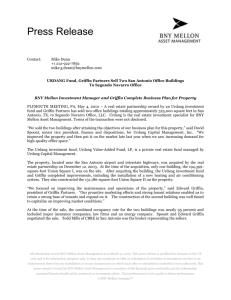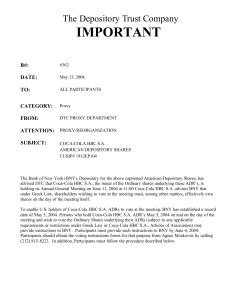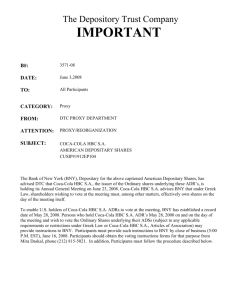Copies of decisions posted on this site have been downloaded from
advertisement
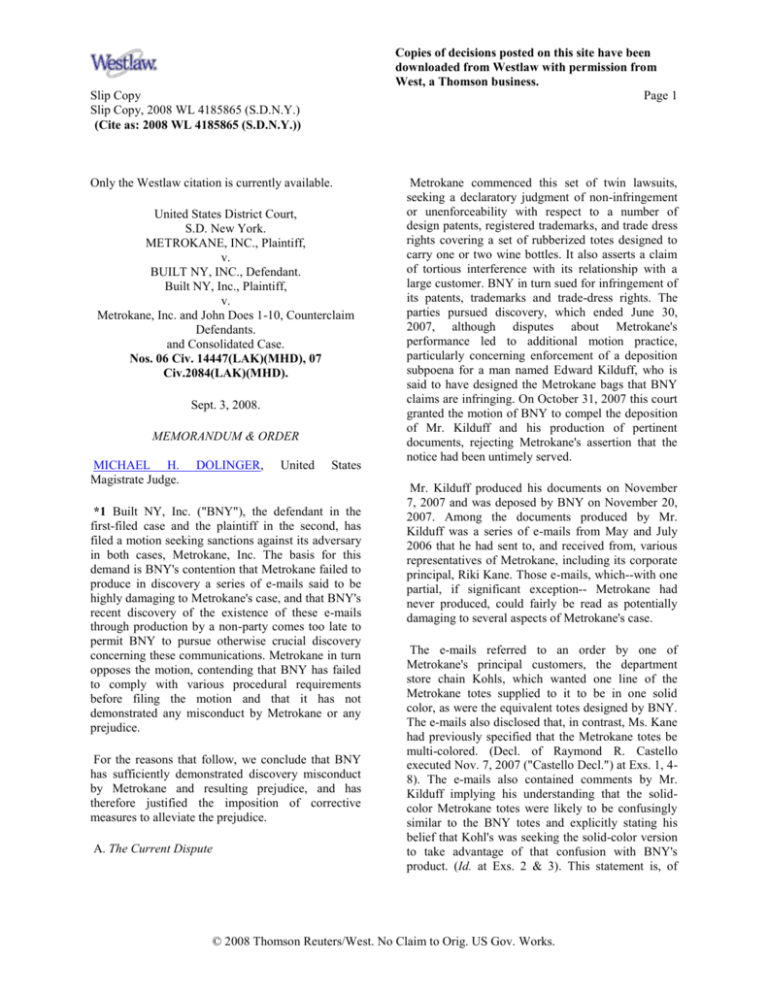
Copies of decisions posted on this site have been downloaded from Westlaw with permission from West, a Thomson business. Page 1 Slip Copy Slip Copy, 2008 WL 4185865 (S.D.N.Y.) (Cite as: 2008 WL 4185865 (S.D.N.Y.)) Only the Westlaw citation is currently available. United States District Court, S.D. New York. METROKANE, INC., Plaintiff, v. BUILT NY, INC., Defendant. Built NY, Inc., Plaintiff, v. Metrokane, Inc. and John Does 1-10, Counterclaim Defendants. and Consolidated Case. Nos. 06 Civ. 14447(LAK)(MHD), 07 Civ.2084(LAK)(MHD). Sept. 3, 2008. MEMORANDUM & ORDER MICHAEL H. Magistrate Judge. DOLINGER, United States *1 Built NY, Inc. ("BNY"), the defendant in the first-filed case and the plaintiff in the second, has filed a motion seeking sanctions against its adversary in both cases, Metrokane, Inc. The basis for this demand is BNY's contention that Metrokane failed to produce in discovery a series of e-mails said to be highly damaging to Metrokane's case, and that BNY's recent discovery of the existence of these e-mails through production by a non-party comes too late to permit BNY to pursue otherwise crucial discovery concerning these communications. Metrokane in turn opposes the motion, contending that BNY has failed to comply with various procedural requirements before filing the motion and that it has not demonstrated any misconduct by Metrokane or any prejudice. For the reasons that follow, we conclude that BNY has sufficiently demonstrated discovery misconduct by Metrokane and resulting prejudice, and has therefore justified the imposition of corrective measures to alleviate the prejudice. A. The Current Dispute Metrokane commenced this set of twin lawsuits, seeking a declaratory judgment of non-infringement or unenforceability with respect to a number of design patents, registered trademarks, and trade dress rights covering a set of rubberized totes designed to carry one or two wine bottles. It also asserts a claim of tortious interference with its relationship with a large customer. BNY in turn sued for infringement of its patents, trademarks and trade-dress rights. The parties pursued discovery, which ended June 30, 2007, although disputes about Metrokane's performance led to additional motion practice, particularly concerning enforcement of a deposition subpoena for a man named Edward Kilduff, who is said to have designed the Metrokane bags that BNY claims are infringing. On October 31, 2007 this court granted the motion of BNY to compel the deposition of Mr. Kilduff and his production of pertinent documents, rejecting Metrokane's assertion that the notice had been untimely served. Mr. Kilduff produced his documents on November 7, 2007 and was deposed by BNY on November 20, 2007. Among the documents produced by Mr. Kilduff was a series of e-mails from May and July 2006 that he had sent to, and received from, various representatives of Metrokane, including its corporate principal, Riki Kane. Those e-mails, which--with one partial, if significant exception-- Metrokane had never produced, could fairly be read as potentially damaging to several aspects of Metrokane's case. The e-mails referred to an order by one of Metrokane's principal customers, the department store chain Kohls, which wanted one line of the Metrokane totes supplied to it to be in one solid color, as were the equivalent totes designed by BNY. The e-mails also disclosed that, in contrast, Ms. Kane had previously specified that the Metrokane totes be multi-colored. (Decl. of Raymond R. Castello executed Nov. 7, 2007 ("Castello Decl.") at Exs. 1, 48). The e-mails also contained comments by Mr. Kilduff implying his understanding that the solidcolor Metrokane totes were likely to be confusingly similar to the BNY totes and explicitly stating his belief that Kohl's was seeking the solid-color version to take advantage of that confusion with BNY's product. (Id. at Exs. 2 & 3). This statement is, of © 2008 Thomson Reuters/West. No Claim to Orig. US Gov. Works. Slip Copy Slip Copy, 2008 WL 4185865 (S.D.N.Y.) (Cite as: 2008 WL 4185865 (S.D.N.Y.)) course, inconsistent with Metrokane's contention that the bags were not so similar. *2 During the discovery period Metrokane had produced one partially redacted page reflecting two of these e-mails between Kilduff and Metrokane. The portion provided by Metrokane contained the statement by Kilduff that the order by Kohl's of a solid-color bag reflected that Kohls "obviously want[ed] to knock ... off" BNY's bag. (Id. at Ex. 3). The redaction by Metrokane, however, concealed a follow-up exchange between Kane and Kilduff, in which Kane appeared to state that Metrokane had agreed to indemnify Kohls for such infringement, leading to a brief, if pungent, comment by Kilduff that if Metrokane was responsible for sales by Kohl's, "We[']re in trouble then." (Id. at Ex. 2). This statement by Kilduff is potentially helpful to BNY for two reasons. First, it dramatically reinforces the notion that Kilduff was aware of confusing similarity between the two lines of totes. Second, it highlights the fact that Kane knew of the similarity and the problem. That said, it bears emphasis that the redacted version of this e-mail originally produced by Metrokane offered similar information since it contained Kilduff's comment about Kohls' intention to "knock ... off" BNY's tote. (Id. at Ex. 3). BNY also points out that the other e-mails produced by Kilduff, but not by Metrokane, reflect that Kane had been clearly insisting before the Kohl's order that the Metrokane totes be multi-colored. (BNY Mem. of Law in Support of Motion for Discovery Sanctions ("BNY Sanctions Mem.") at 4 (citing Castello Decl. at Exs. 1, 4-8)). BNY suggests that the disclosure of this information indicates that Kane was aware that a solid-color tote would potentially infringe on BNY's intellectual property rights. In addition, as noted, the e-mails produced by Kilduff contained a statement by Ms. Kane--not previously disclosed by Metrokane--that "Kohls is 100% indemnified", thus indicating that Metrokane had fully indemnified Kohl's by that time. (Castello Decl. at Ex. 2). That statement, if literally true, is said to be inconsistent with representations made by Metrokane in connection with its pending claim for tortious interference with Metrokane's business relationship with Kohl's. (BNY Sanctions Mem. at 56). As alleged by Metrokane, the claim rests on a Page 2 letter sent by BNY to Kohl's many months after this July 2006 e-mail exchange, in which BNY warned Kohl's that the Metrokane bags that it was selling infringed BNY's patents and trademarks. Metrokane has asserted that this letter led Kohl's to demand an indemnification agreement from Metrokane and ultimately caused Kohl's not to re-order the product. If, however, Kohl's already had an indemnification agreement with Metrokane, that would contradict at least a portion of Metrokane's narrative and also throw some doubt on its contention that it was the BNY letter that led Kohl's to discontinue selling these totes. BNY points out that the production by Kilduff took place many months after the conclusion of discovery and thereby deprived BNY of the opportunity to explore these matters with Ms. Kane and other Metrokane representatives. (Id. at 6). Accordingly, it says, it has been irremediably prejudiced and therefore seeks preclusive sanctions, including dismissal of Metrokane's claims. (Id. at 8- 9). *3 In responding, Metrokane offers both procedural and substantive arguments. It first asserts that the motion should be denied because BNY failed to consult with Metrokane about the dispute before bringing it to the court's attention, and then failed to ask for a pre-motion conference before filing its application. (Metrokane Mem. of Law in Opp. to BNY's Cross-Motion for Sanctions ("Metrokane Sanctions Opp. Mem.") at 1-2). As for the merits, Metrokane offers no evidence to explain its failure to produce the cited e-mails. Rather, it makes a vague assertion in its attorney's memorandum of law that the company had no written policy regarding the retention of documents. (Id. at 7). The implication-although Metrokane makes no direct assertion to this effect, either by competent testimony or even by the assertion of its attorneys--is that Metrokane did not produce the e-mails in question because they were no longer in its system. As for BNY's assertion of prejudice, Metrokane argues, albeit in vague terms, that the e-mails that it failed to produce might be construed as favorable to it and that in any event BNY was lax in not pursuing the question of Metrokane's document-retention policies during discovery. B. Assessment of BNY's Motion © 2008 Thomson Reuters/West. No Claim to Orig. US Gov. Works. Slip Copy Slip Copy, 2008 WL 4185865 (S.D.N.Y.) (Cite as: 2008 WL 4185865 (S.D.N.Y.)) At the outset we reject the procedural defenses to the motion advanced by Metrokane. A meet-and-confer session would have been futile. The alleged injury to BNY was imposed by the delay, and if we credited Metrokane's implicit suggestion that it did not have the e-mails anymore, then the meeting would not have yielded any concrete result that would have obviated the motion. As for a possible request for an informal conference before the court, had we been presented with one we would presumably have instructed BNY to file a motion. As for the substance of BNY's motion, we start with certain basic premises. Where a party claims that its adversary failed to produce required discovery about which the complaining party did not know, and that this failure prejudiced the party, the court has broad discretion in providing a remedy. E.g., Residential Funding Corp. v. DeGeorge Financial Corp., 306 F.3d 99, 107 (2d Cir.2003. Moreover, although Fed. R. Civ. Proc. 37(b) outlines a non-exclusive range of remedies available for a party's failure to comply with a prior discovery order, even in the absence of such an order the court may impose sanctions for discovery misconduct as an assertion of its inherent powers. E.g., id ... In this case BNY notes that, long after the conclusion of discovery and the full briefing of summaryjudgment motions, a nonparty produced a series of emails that he had exchanged with Metrokane, and it accuses Metrokane of having failed to turn over--with one limited exception--its copies of these documents during discovery. It also notes that Metrokane vigorously resisted compelling the witness to produce documents and appear for a deposition. There is no question that the e-mails are highly relevant to the claims and defenses in this case, and there is no dispute that they come within the scope of BNY's written discovery requests. There is also no serious question that if BNY had received them in a timely fashion from Metrokane, it would have pursued questioning about them with one or more of Metrokane's representatives, including Ms. Kane. *4 In opposing BNY's motion Metrokane fails to offer any evidence on which to premise an explanation for its failure to produce these documents, and indeed offers no explicit explanation. Its only reference to the possibility of an explanation Page 3 is (1) a cryptic assertion in its memorandum of law that BNY did not pursue during discovery the question of Metrokane's document retention practices, (Metrokane Sanctions Opp. Mem. at 7), and (2) an equally cryptic statement in that same memorandum that Metrokane did not have any policies regarding document retention. (Id.). If Metrokane is seeking to imply that it disposed of these e-mails before their production was called for, its position is unsustainable for a variety of reasons. First, in the absence of any evidence from Metrokane, we cannot find, as it seems to be subtly hinting, that it did not have possession or control of the e-mails in question when called upon to produce relevant documents in this case. Plainly the knowledge of whether the company had access to those e-mails at the pertinent time rests solely with Metrokane, and its failure to proffer any evidence pertinent to that question impels an inference that it cannot demonstrate non-possession. Second, that inference is further strengthened by Metrokane's production of a fragment of the e-mails dating from July 6, 2006. (Castello Decl. at Ex. 3). If its employees had been systematically purging emails from their computer files, we would not expect the company to be able to produce the two e-mails that it did disclose, albeit in redacted form. Third, we note the very careful avoidance by Metrokane of any direct representation--even in the form of a non-admissible attorney's assertion--that the company did not have the unproduced e-mails in its possession. Fourth, even if we concluded, notwithstanding the absence of any evidence, that Metrokane no longer had the e-mails in question during discovery, that would not help the company. The courts have repeatedly noted that a person or entity that is aware of the potential for involvement in litigation has an obligation to preserve relevant files and computer data. As recently summarized: "The obligation to preserve evidence arises when the party has notice that the evidence is relevant to litigation or when a party should have known that the evidence may be relevant to future litigation." Fujitsu Ltd. v. Federal Express Corp., 247 F.3d 423, 436 (2d Cir.2001). Thus, "[o]nce a party reasonably anticipates litigation, it must suspend its © 2008 Thomson Reuters/West. No Claim to Orig. US Gov. Works. Slip Copy Slip Copy, 2008 WL 4185865 (S.D.N.Y.) (Cite as: 2008 WL 4185865 (S.D.N.Y.)) routine document retention/destruction policy and put in place a 'litigation hold' to ensure the preservation of relevant documents." Zubulake v. UBS Warburg LLC, 220 F.R.D. 212, 218 (S.D.N.Y.2003) ("Zubulake IV" ). Treppel v. Biovail Corp., 2008 WL 866594, *5 (S.D.N.Y. April 2, 2008). At the very least, by the time of the July 2006 e-mail exchanges Metrokane was manifestly aware of the potential for litigation with BNY, as evidenced by the discussion between Mr. Kilduff and Ms. Kane about the indemnification arrangement with Kohl's and the apparent intention of Kohl's--in Mr. Kilduff's view-to infringe BNY's protected interests in a wine-bottle carrier. If Metrokane destroyed the e-mails in question at some time thereafter it was in evident violation of its obligation of preservation, and may thus be charged with the consequences of its spoliation. See, e.g., Zubulake, 220 F.R.D. 212, 216 (S.D.N.Y.2003). *5 The remaining question concerns what measures are appropriate to purge whatever prejudice BNY may have suffered by virtue of Metrokane's failure to make timely production of the e-mails. The determination of the sanction should be a product of the court's assessment of the degree of fault of the party against whom sanctions are sought and the extent of the prejudice to the moving party. See, e.g., Reilly v. Natwest Markets Group, Inc., 181 F.3d 253, 267- 68 (2d Cir.1999); Treppel, 2008 WL 866594 at *11; Klezmer v. Buynak, 227 F.R.D. 43, 51 (E.D.N.Y.2005). Given the evidentiary record, including the complete silence of Metrokane as to why it failed to produce the e-mails in question, we infer at a minimum that it was negligent either in failing to produce documents available to it or in failing to preserve documents that it was obliged to safeguard. We are not prepared to find any greater degree of fault with respect to the bulk of the e-mails, particularly in view of the company's production of those e-mails that reflect Mr. Kilduff's apparent view that the solid-color bags ordered by Kohl's would infringe on BNY's intellectual property rights. The two exceptions are the deletion of Mr. Kilduff's last comment about Metrokane being in trouble, since that redaction was plainly deliberate and inexcusable, and Metrokane's failure to disclose Ms. Kane's seeming reference to an Page 4 existing indemnification of Kohl's. As for the degree of prejudice, BNY substantially overstates the impact of the non-production, which is, in any event, in large measure remediable. BNY was on timely notice, at the very least from the fragments of e-mails actually disclosed by Metrokane, that the question of whether the Metrokane totes should be in a solid color or multi-colors was a topic of discussion within Metrokane and between it and Kohl's and that Metrokane had reason to believe that the decision might impact whether those bags would be confusingly similar to those of BNY. Moreover, the extent of Ms. Kane's original intention to make them multi-colored was clearly-enough tagged as an issue in the disclosed e-mails to have permitted BNY to pursue the matter in depositions. The most troubling issue is the impact of Metrokane's concealment of Ms. Kane's statement that Kohls was "100% indemnified" many months before the BNY letter that forms the basis for Metrokane's claim for tortious interference. That nondisclosure prevented BNY from questioning Ms. Kane and others at Metrokane and possibly Kohl's about this statement, pursuing the possible existence of relevant indemnification documents, or arguing the point in connection with the pending summaryjudgment motions. In addition, the failure to turn over this portion of the e-mail appears, as we have noted, to have been deliberate as well as completely unjustified. To address these varied difficulties, we conclude that the following remedies are appropriate. First, for purposes of the summary-judgment motions, we deem Ms. Kane's statement in her e-mail about the indemnified status of Kohl's to be binding and included within the summary-judgment record. Second, if the tortious-interference claim survives summary judgment, [FN1] Metrokane will be required, at least two weeks before trial, to make Ms. Kane and any other Metrokane witness competent to testify about the timing and substance of the indemnification of Kohls available for deposition by BNY, with the costs of that deposition, as well as reasonable attorney's fees incurred in preparing for it and conducting it to be borne by Metrokane. Third, at such a trial, BNY will be permitted to offer evidence as to Metrokane's concealment of this e-mail and will be entitled to a jury instruction as to the possible © 2008 Thomson Reuters/West. No Claim to Orig. US Gov. Works. Slip Copy Slip Copy, 2008 WL 4185865 (S.D.N.Y.) (Cite as: 2008 WL 4185865 (S.D.N.Y.)) inferences that the jurors may draw from the concealment of this e-mail. Finally, BNY is awarded the expenses, including reasonable attorney's fees, incurred in preparing and briefing this sanctions motion. BNY may serve and file an affidavit within two weeks documenting those expenses. Metrokane may respond to this submission within one week thereafter. FN1. In a contemporaneously filed Report and Recommendation, we recommend that summary judgment be granted dismissing this claim for other reasons. Metrokane, Inc. v. Built New York, Inc., 06 Civ. 14447 & 07 Civ.2084(LAK)(MHD), Report & Recommendation at 85-96 (S.D.N.Y. Sept. 2, 2008) CONCLUSION *6 For the reasons stated, the sanctions motion of BNY is granted to the extent stated. Slip Copy, 2008 WL 4185865 (S.D.N.Y.) END OF DOCUMENT © 2008 Thomson Reuters/West. No Claim to Orig. US Gov. Works. Page 5
